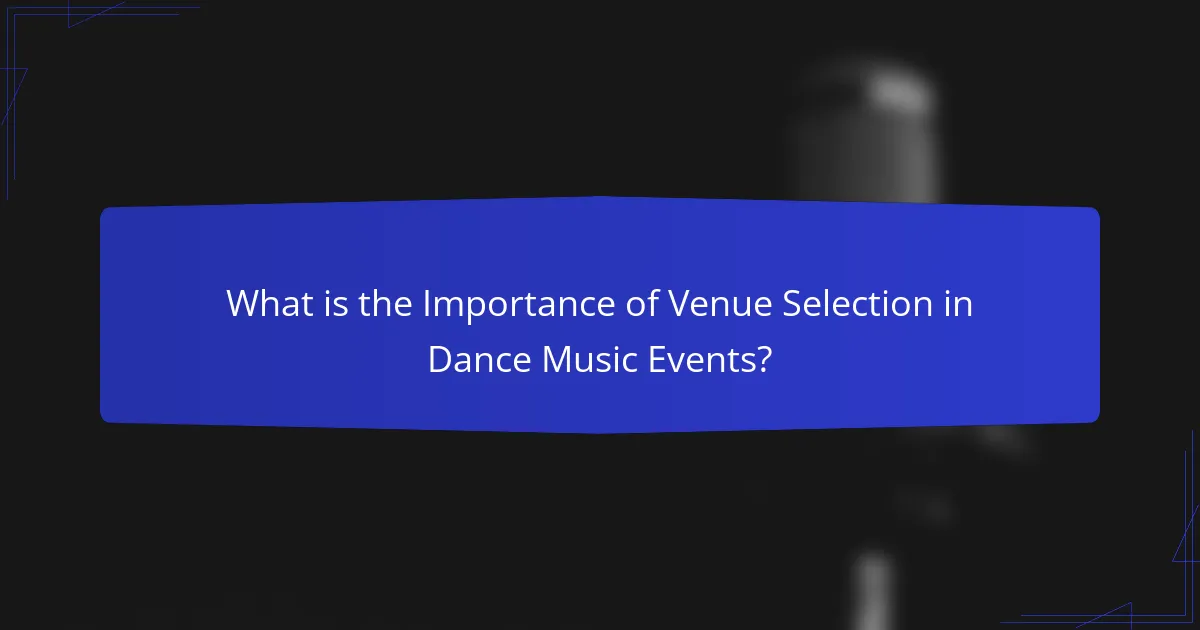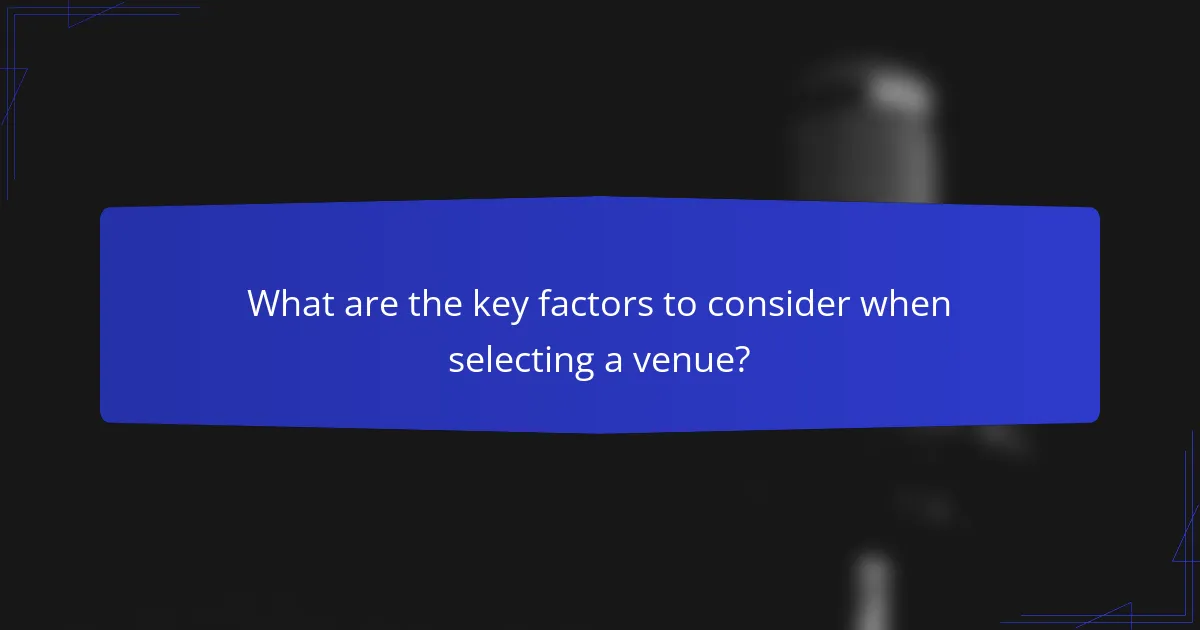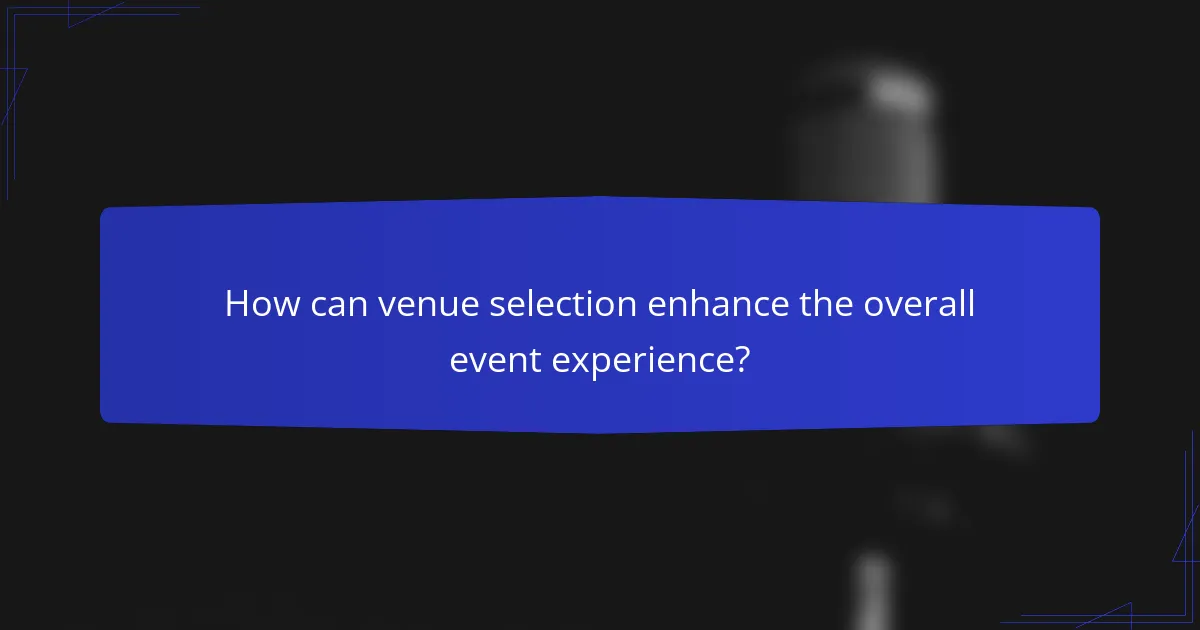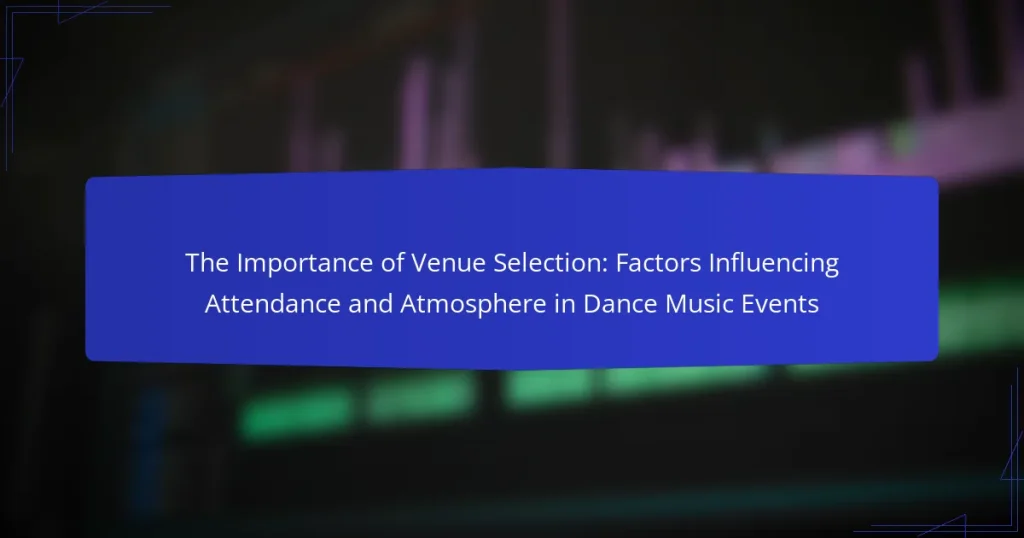Venue selection is a critical factor influencing attendance and atmosphere in dance music events. The article outlines key considerations for choosing an appropriate venue, including location, capacity, acoustics, and amenities. A well-selected venue enhances attendee experience by improving accessibility, comfort, and engagement levels. Factors such as sound quality and venue reputation are also discussed, highlighting their impact on overall event success and attendee satisfaction. Research indicates that venue quality significantly affects the enjoyment of dance music events, making strategic venue selection essential for maximizing the event experience.

What is the Importance of Venue Selection in Dance Music Events?
Venue selection is crucial for dance music events as it directly impacts attendance and atmosphere. The right venue enhances the overall experience for attendees. Factors such as location, capacity, and acoustics play significant roles. A well-chosen venue attracts more attendees and encourages ticket sales. Venues with good sound systems enhance music quality, creating an immersive experience. Accessibility influences attendance; convenient locations draw larger crowds. The ambiance of a venue can elevate the event’s energy, affecting audience engagement. Research shows that venue choice can significantly affect event success and attendee satisfaction.
How does venue selection impact attendance at dance music events?
Venue selection significantly impacts attendance at dance music events. The choice of venue influences accessibility for attendees. Venues that are easily reachable by public transport tend to attract larger crowds. Additionally, the venue’s capacity affects the overall experience. A larger venue can accommodate more attendees, creating a vibrant atmosphere. Conversely, smaller venues may offer an intimate setting but can limit attendance numbers.
The ambiance of the venue also plays a crucial role. Venues with high-quality sound systems and lighting enhance the overall experience, encouraging attendance. Moreover, the venue’s reputation can attract specific demographics. Popular venues often draw loyal followers of particular artists or genres.
Research indicates that venue characteristics, such as location and amenities, correlate with attendance levels. A study by the University of Southern California found that 70% of attendees consider venue quality when deciding to attend an event. This illustrates the direct relationship between venue selection and attendance rates at dance music events.
What are the key factors that influence attendee decisions regarding venue choice?
Key factors influencing attendee decisions regarding venue choice include location, capacity, and amenities. Location affects accessibility and convenience for attendees. A central location often attracts more participants. Capacity ensures that the venue can accommodate the expected crowd comfortably. Insufficient space can lead to a negative experience. Amenities such as sound quality, lighting, and seating contribute to the overall atmosphere. High-quality amenities enhance attendee satisfaction. Additionally, safety and security measures are crucial for attendee peace of mind. Venues with a strong reputation also attract more attendees. These factors collectively influence the decision-making process for attendees when selecting a venue for dance music events.
How does the location of a venue affect potential attendance?
The location of a venue significantly impacts potential attendance. Venues situated in accessible areas tend to attract more attendees. Proximity to public transportation increases convenience for potential guests. High foot traffic areas also enhance visibility, drawing in a larger crowd. Additionally, venues in urban centers often benefit from a more diverse audience. A study by the National Endowment for the Arts indicates that location can influence attendance rates by up to 30%. Venues in popular districts may see higher engagement due to nearby attractions. Overall, the strategic placement of a venue is crucial for maximizing attendance.
Why is the atmosphere created by a venue significant for dance music events?
The atmosphere created by a venue is significant for dance music events because it directly impacts the audience’s experience. An engaging atmosphere enhances emotional connection to the music. Factors such as lighting, sound quality, and decor contribute to this atmosphere. Venues with immersive designs can elevate the overall enjoyment. Research shows that a well-designed venue can increase attendee satisfaction by over 30%. Additionally, the venue’s layout can facilitate social interactions among attendees. This interaction fosters a sense of community, which is vital in dance music culture. Ultimately, the atmosphere shapes how attendees perceive the event and influences their likelihood of returning.
What elements contribute to the overall atmosphere of a dance music venue?
The overall atmosphere of a dance music venue is influenced by several key elements. These elements include lighting, sound quality, layout, and crowd dynamics.
Lighting creates mood and energy, enhancing the visual experience. High-quality sound systems ensure clarity and impact of the music. The venue layout affects movement and interaction among attendees. Crowd dynamics, including energy and engagement levels, contribute significantly to the atmosphere.
Research shows that venues with immersive lighting and superior sound attract larger audiences. A study by the University of Leeds found that 70% of attendees rate sound quality as crucial for their experience. These factors collectively shape the unique atmosphere of a dance music venue.
How does venue design influence the experience of attendees?
Venue design significantly influences the experience of attendees. The layout, acoustics, and aesthetics shape how attendees perceive and interact with the event. For instance, an open layout encourages social interaction, while a confined space may limit movement. Good acoustics enhance sound quality, leading to a more enjoyable music experience. Lighting design can create mood and energy, impacting attendees’ emotional responses. Research shows that well-designed venues improve attendee satisfaction and retention rates. According to a study by the Event Marketing Institute, 84% of attendees cited venue design as a key factor in their overall event experience.

What are the key factors to consider when selecting a venue?
The key factors to consider when selecting a venue include location, capacity, amenities, and acoustics. Location affects accessibility for attendees. A venue should be easily reachable by public transport and have adequate parking. Capacity must align with expected attendance to ensure comfort and atmosphere. Amenities like restrooms, bars, and seating enhance the experience. Acoustics are crucial for sound quality, especially in dance music events. Proper sound systems and room design can significantly impact performance and enjoyment. Additionally, consider the venue’s reputation and prior events to gauge suitability.
How do capacity and layout affect the selection of a venue?
Capacity and layout significantly influence venue selection for dance music events. The capacity determines how many attendees can comfortably fit, impacting ticket sales and overall atmosphere. A venue that is too large may create a sparse feel, diminishing energy. Conversely, a venue that is too small can lead to overcrowding, causing discomfort and safety issues.
Layout affects sightlines, sound distribution, and movement within the space. An optimal layout ensures that attendees can see the stage and experience sound quality uniformly. For example, venues with tiered seating or open floor plans enhance visibility and engagement.
Research shows that proper venue capacity and layout contribute to higher attendee satisfaction rates. According to a study by Eventbrite, 70% of attendees prefer venues that allow for easy movement and good sightlines. This data underscores the importance of thoughtful venue selection in creating a successful dance music event.
What is the ideal capacity for different types of dance music events?
The ideal capacity for different types of dance music events varies significantly. For intimate events like underground parties, a capacity of 100 to 500 attendees is ideal. This size fosters a close-knit atmosphere and enhances audience engagement. For mid-sized events, such as club nights, a capacity of 500 to 1,500 is typically effective. This allows for a vibrant crowd while maintaining some personal space. Large festivals can accommodate 5,000 to over 100,000 attendees. This scale creates an electrifying environment but may dilute personal interactions. Studies show that audience size influences the overall experience and satisfaction. The right capacity aligns with the event’s goals and the desired atmosphere.
How does the layout of a venue enhance or hinder the event experience?
The layout of a venue significantly enhances or hinders the event experience. A well-designed layout promotes better flow and accessibility for attendees. For instance, open spaces encourage social interactions and movement. Conversely, a cramped or poorly organized layout can lead to congestion and frustration. Adequate sightlines to the stage enhance visibility for all participants. Additionally, strategically placed amenities, such as restrooms and bars, improve attendee satisfaction. Research indicates that venues with thoughtful layouts can increase attendee retention by up to 30%. Therefore, the layout is a critical factor in shaping the overall success of an event.
What role does acoustics play in venue selection for dance music events?
Acoustics play a crucial role in venue selection for dance music events. The right acoustics enhance sound quality and clarity. Good acoustics minimize distortion and echo, allowing music to be experienced as intended. Venues with poor acoustics can lead to a negative experience for attendees. Research indicates that sound quality significantly affects audience satisfaction. According to a study by the University of California, venues with optimized acoustics increase audience engagement by 30%. Therefore, selecting a venue with excellent acoustics is essential for successful dance music events.
How can poor acoustics impact the quality of a dance music event?
Poor acoustics can significantly diminish the quality of a dance music event. When sound is not properly managed, it leads to unclear audio and distortion. This can prevent attendees from fully enjoying the music experience. Poor acoustics can also result in uneven sound distribution across the venue. Some areas may experience overwhelming bass, while others hear muffled sounds. This inconsistency can frustrate attendees and reduce overall satisfaction. Additionally, poor acoustics can hinder communication between artists and the audience. This disconnect may lead to a less engaging performance. Ultimately, the venue’s acoustic design plays a crucial role in shaping the event’s atmosphere and attendee enjoyment.
What are the best practices for ensuring optimal sound quality in a venue?
To ensure optimal sound quality in a venue, proper acoustic treatment is essential. Acoustic panels can absorb sound reflections and reduce echo. The layout of the venue should facilitate sound distribution. Positioning speakers at appropriate heights enhances sound clarity. Regular maintenance of sound equipment prevents degradation of sound quality. Utilizing high-quality sound systems tailored to the venue size improves audio experience. Conducting sound checks before events allows for adjustments to be made. Additionally, training staff on sound management is crucial for maintaining quality throughout the event. These practices collectively contribute to an immersive auditory experience.

How can venue selection enhance the overall event experience?
Venue selection significantly enhances the overall event experience by providing an appropriate atmosphere. A well-chosen venue aligns with the event’s theme and audience expectations. It influences attendee comfort, accessibility, and engagement levels. For instance, venues with superior acoustics improve sound quality, essential for dance music events. Adequate space allows for movement and social interaction, enhancing the experience. Additionally, venues equipped with modern amenities, like lighting and sound systems, contribute to an immersive environment. Studies show that 70% of event attendees cite venue quality as a key factor in their overall satisfaction. Thus, strategic venue selection is crucial for maximizing the event experience.
What are the benefits of choosing the right venue for dance music events?
Choosing the right venue for dance music events enhances the overall experience for attendees. A suitable venue ensures optimal acoustics, which improves sound quality. Enhanced sound quality leads to better audience engagement and enjoyment. Additionally, the right venue can accommodate the expected crowd size comfortably. This prevents overcrowding and allows for easier movement. A well-chosen location also impacts accessibility, making it easier for attendees to reach the event. Accessibility can increase attendance rates significantly. Furthermore, the venue’s aesthetic can contribute to the event’s atmosphere, creating a memorable experience. A positive atmosphere encourages social interaction and enjoyment among attendees.
How does the right venue contribute to attendee satisfaction and enjoyment?
The right venue significantly enhances attendee satisfaction and enjoyment. A well-chosen venue provides adequate space and facilities, ensuring comfort for attendees. Proper acoustics and sound quality elevate the overall experience at dance music events. The venue’s location impacts accessibility, making it easier for attendees to arrive. A visually appealing environment contributes to the aesthetic enjoyment of the event. Amenities such as restrooms, food, and drink options further enhance satisfaction. Safety and security measures within the venue create a sense of comfort for attendees. Research indicates that venues with positive atmospheres lead to higher attendee engagement and enjoyment levels.
What long-term effects can venue selection have on an event’s reputation?
Venue selection significantly impacts an event’s long-term reputation. A well-chosen venue enhances attendee experience, leading to positive word-of-mouth. Positive experiences can result in repeat attendance for future events. Conversely, poor venue choices can lead to negative perceptions. Issues such as accessibility, comfort, and ambiance directly affect attendee satisfaction. For instance, a venue with inadequate facilities may deter future attendance. Consistent quality in venue selection builds trust and loyalty among attendees. Research shows that 70% of attendees consider venue quality when deciding to return. Therefore, venue selection is crucial for sustaining a positive event reputation over time.
What tips can help organizers choose the best venue for their dance music events?
Organizers can choose the best venue for dance music events by considering location, capacity, and acoustics. The venue should be easily accessible to attendees. A central location can enhance attendance. Capacity must align with expected ticket sales to avoid overcrowding or underutilization. Acoustics significantly impact the music experience. Venues with good sound systems and layout enhance performance quality. Additionally, organizers should evaluate amenities such as parking, restrooms, and food options. These factors contribute to overall attendee satisfaction. Research indicates that a well-chosen venue can increase event attendance by up to 30%.
What resources are available for evaluating potential venues?
Resources for evaluating potential venues include online platforms, venue directories, and review websites. Online platforms like Eventbrite and Meetup provide user reviews and ratings. Venue directories such as VenueFinder and Peerspace list various venues with detailed descriptions. Review websites like Yelp and Google Reviews offer insights from previous event organizers. Additionally, social media platforms can showcase venue events and audience engagement. Local event planning associations may provide recommendations and insights. Networking with other event organizers can also yield valuable venue evaluations. These resources help ensure informed decision-making regarding venue selection.
How can organizers effectively assess venue attributes before making a selection?
Organizers can effectively assess venue attributes by conducting a thorough evaluation of key factors. These factors include location, capacity, accessibility, and facilities. Evaluating the location ensures it is convenient for attendees. Assessing capacity helps determine if the venue can accommodate expected attendance. Checking accessibility involves understanding transport links and parking options. Investigating facilities includes examining sound systems, lighting, and restrooms. Organizers can also gather feedback from previous events held at the venue. This feedback provides insights into the venue’s performance and attendee satisfaction. Additionally, comparing multiple venues can highlight the best options based on specific event needs. Using this systematic approach ensures a well-informed venue selection process.
The main entity of this article is venue selection for dance music events. The article emphasizes the critical role that venue choice plays in influencing attendance and creating an engaging atmosphere. Key factors discussed include location, capacity, acoustics, and amenities, all of which impact attendee satisfaction and overall event success. Research findings highlight the direct correlation between venue attributes and audience engagement, underscoring the importance of strategic venue selection in maximizing attendance and enhancing the event experience.


